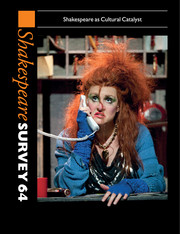Book contents
- Frontmatter
- CONTENTS
- ILLUSTRATIONS
- The Commercial Bard: Business Models for the Twenty-First Century
- International Innovation? Shakespeare as Intercultural Catalyst
- Brand Shakespeare?
- Global Shakespeare 2.0 and the Task of the Performance Archive
- An International Database of Shakespeare on Film, Television and Radio
- ‘Sounds and Sweet Airs’: Music in Shakespearian Performance History
- Using Shakespeare with Memes, Remixes and Fanfic
- ‘Pretty Much how the Internet Works’; or, Aiding and Abetting the Deprofessionalization of Shakespeare Studies
- Catalysing What? Historical Remediation, the Musical, and What of Love's Labour's Lasts
- Kabuki Twelfth Night and Kyogen Richard III: Shakespeare as a Cultural Catalyst
- The Sonnets as an Open-Source Initiative
- ‘A Stage of the Mind’: Hamlet on Post-War British Radio
- Post-Textual Shakespeare
- I am What I am Not: Identifying with the Other in Othello
- Desdemona's Book, Lost and Found
- Non-Catalyst and Marginal Shakespeares in the Nineteenth-Century Revival of Catalan-Speaking Cultures
- Shakespeare, Mácha and Czech Romantic Historicism
- An Irish Catalysis: W. B. Yeats and the Uses of Shakespeare
- François-Victor Hugo and the Limits of Cultural Catalysis
- ‘You Taught me Language’: Shakespeare in India
- There is Some Soul of Good: An Action-Centred Approach to Teaching Shakespeare in Schools
- The Royal Shakespeare Company as ‘Cultural Chemist’
- Shakespeare at the White Greyhound
- Dark Matter: Shakespeare’s Foul Dens and Forests
- What We Hear; What we see: Theatre for a New Audience's 2009 Hamlet
- Narrative of Negativity: Whig Historiography and the Spectre of King James in Measure for Measure
- Québécois Shakespeare goes Global: Robert Lepage's Coriolan
- Endless Mornings on Endless Faces: Shakespeare and Philip Larkin
- Shakespeare Performances in England 2010
- Professional Shakespeare Productions in the British Isles, January–December 2009
- The Year’s Contribution to Shakespeare Studies
- INDEX
- References
The Commercial Bard: Business Models for the Twenty-First Century
Published online by Cambridge University Press: 28 November 2011
- Frontmatter
- CONTENTS
- ILLUSTRATIONS
- The Commercial Bard: Business Models for the Twenty-First Century
- International Innovation? Shakespeare as Intercultural Catalyst
- Brand Shakespeare?
- Global Shakespeare 2.0 and the Task of the Performance Archive
- An International Database of Shakespeare on Film, Television and Radio
- ‘Sounds and Sweet Airs’: Music in Shakespearian Performance History
- Using Shakespeare with Memes, Remixes and Fanfic
- ‘Pretty Much how the Internet Works’; or, Aiding and Abetting the Deprofessionalization of Shakespeare Studies
- Catalysing What? Historical Remediation, the Musical, and What of Love's Labour's Lasts
- Kabuki Twelfth Night and Kyogen Richard III: Shakespeare as a Cultural Catalyst
- The Sonnets as an Open-Source Initiative
- ‘A Stage of the Mind’: Hamlet on Post-War British Radio
- Post-Textual Shakespeare
- I am What I am Not: Identifying with the Other in Othello
- Desdemona's Book, Lost and Found
- Non-Catalyst and Marginal Shakespeares in the Nineteenth-Century Revival of Catalan-Speaking Cultures
- Shakespeare, Mácha and Czech Romantic Historicism
- An Irish Catalysis: W. B. Yeats and the Uses of Shakespeare
- François-Victor Hugo and the Limits of Cultural Catalysis
- ‘You Taught me Language’: Shakespeare in India
- There is Some Soul of Good: An Action-Centred Approach to Teaching Shakespeare in Schools
- The Royal Shakespeare Company as ‘Cultural Chemist’
- Shakespeare at the White Greyhound
- Dark Matter: Shakespeare’s Foul Dens and Forests
- What We Hear; What we see: Theatre for a New Audience's 2009 Hamlet
- Narrative of Negativity: Whig Historiography and the Spectre of King James in Measure for Measure
- Québécois Shakespeare goes Global: Robert Lepage's Coriolan
- Endless Mornings on Endless Faces: Shakespeare and Philip Larkin
- Shakespeare Performances in England 2010
- Professional Shakespeare Productions in the British Isles, January–December 2009
- The Year’s Contribution to Shakespeare Studies
- INDEX
- References
Summary
Whether courting the Court of Queen Elizabeth, or relocating to save the finances of his co-investors, Shakespeare's entrepreneurial skill and nose for the market were as good as his writing.
This, slightly unexpected, invocation of Shakespeare opens a report on ‘The Entrepreneurial Museum’, commissioned by the UK Museums and Libraries Association. The report provides a set of models for museum directors, urging them to embrace new business practices as a way of creating ‘sustainable income through commercial activities’ (p. 1). It urges museum managers to be aware of the commercial potential of the objects in their care and emphasizes the scope for creative association with commercial companies, offering examples of best practice such as ‘the Natural History Museum's T-Rex pyjamas in M&S [Marks and Spencer], the John Lewis’ V&A [Victoria and Albert Museum] secateurs, and the Science Museum's educational toys’.
- Type
- Chapter
- Information
- Shakespeare Survey , pp. 1 - 12Publisher: Cambridge University PressPrint publication year: 2011



